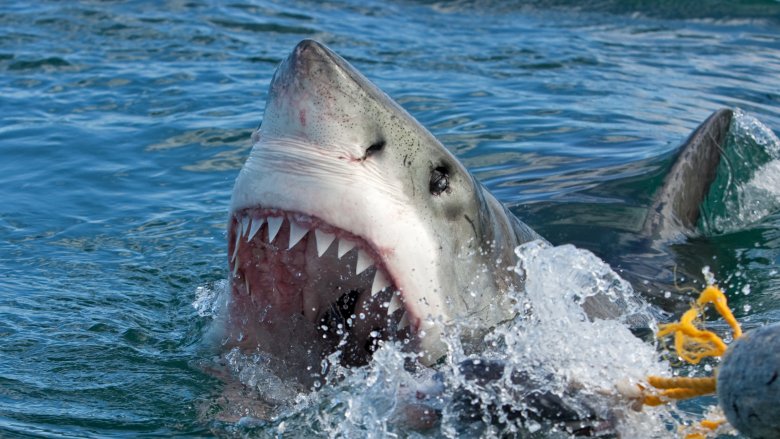This Is The Most Dangerous Shark To Humans
With their beady eyes and voluminous chompers, sharks are the kind of thing pubescent kids have nightmares about kissing, especially because they never blink, according to the Smithsonian. But a kiss is hardly the most unnerving interaction you could have with one of nature's finest living killers. That's because a great many of shark species are capable of causing you bodily harm. Hard to believe, but it's true!
The Florida Museum of Natural History compiled a report dating all the way back to 1580, which tallied shark attacks and the species implicated. The results show that while there have been 33 different species identified in unprovoked attacks on humans, most come from just three dastardly, ornery species, which they call the "Big Three." Those species are great white, tiger, and bull sharks, in descending order of aggression. The report states that of the 828 total recorded shark attacks since 1580, the Big Three have accounted for 525 of them.
Further, out of 160 total deaths from these attacks, the Big Three have logged 138. Yet even among this triad of oceanic executioners, bull and tiger sharks pale in comparison to the great white, which has accounted for almost half of all unprovoked human attacks ending in death, and about a third of total attacks.
But for the record, while sharks are dangerous and should be respected, their prime directive is not to kill all humans. National Geographic points to research that great white bites are often "sample bites," borne out of curiosity rather than a demonic drive to kill. Also, great white sharks just happen to be incredibly well adapted for hunting and killing, which means even the slightest use of their roughly 300 serrated, multi-tiered, triangular teeth can lead to a big wound, according to the World Wildlife Fund. Those teeth are made for tough scale and bone, and our puny human skin is no match.
So, steer clear of Jaws stars and don't antagonize them. But do keep in mind: they are not sent here to destroy us, and are a valuable part of our ecosystem that we should work to preserve — yes, even the sharks that are most potentially dangerous to humans.
